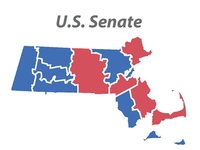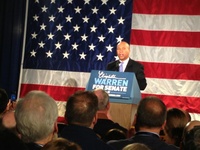The same combination of moderate political stances and personal appeal that led to Brown’s victory in 2010 often made it seem that he could pull off reelection. Warren struggled to gain political footing early in the campaign and even as Massachusetts enthusiastically supported the president, his former adviser initially failed to win over the independents and conservative Democrats who helped elect Brown in 2010.
Ultimately those groups sufficiently coalesced around Warren as she tapped the combined benefits of near-record voter turnout and an unparalleled grassroots ground game.
Though not all the votes had been tabulated at press time, voter turnout in Massachusetts topped three million, approaching a record high.
In the Democratic strongholds of Boston and Cambridge, Warren won 74 percent and 85 percent, respectively. But she was also able to cut into Brown’s margins along the North and South shores, where he won convincingly in 2010.
Warren campaign volunteers knocked on over 200,000 doors and made 600,000 phone calls the weekend before Election Day, according to the campaign’s press secretary Alethea Harney. They expected to have deployed some 20,000 volunteers by the time polls closed Tuesday.
Multimedia
“This was a campaign that broke records, raising more money from small donors than any Senate campaign before it, knocking on more doors,” Warren said. “And let me be clear, I didn’t build that, you built that.”
Both Brown and Warren were boosted throughout the year-long race by a great deal of out-of-state financial and organizational support. The match-up proved to be the most expensive and hotly contested Congressional race in the country, costing more than $68 million and prompting a parade of national political figures to weigh in on both sides.
Warren, 63, began her career at the University of Houston Law Center in the late 1970s and spent more than three decades climbing the academic ladder as a legal expert focusing on consumer finance. She gained national prominence as the chief regulator for the government’s TARP bailout program in 2008 and then as the intellectual founder of the Consumer Financial Protection Bureau.
Warren has been the Leo Gottleib professor of Law at Harvard since 1995 and her husband, Bruce H. Mann, is a professor at the Law School. Warren, who has been on leave since declaring her candidacy for Senate last fall, will vacate her professorship officially at the end of the semester.
—Staff writer Nicholas P. Fandos can be reached at nicholasfandos@college.harvard.edu.











